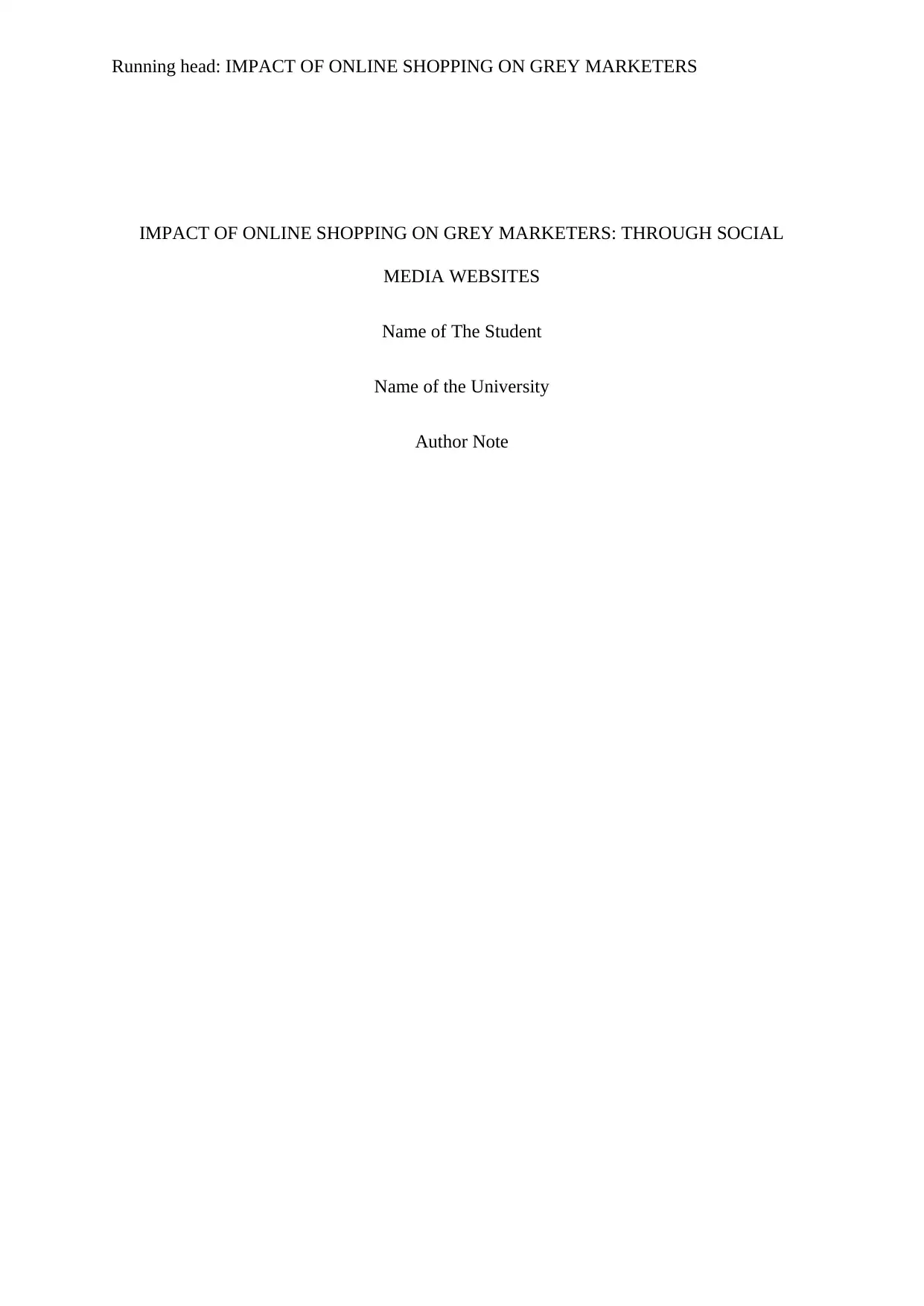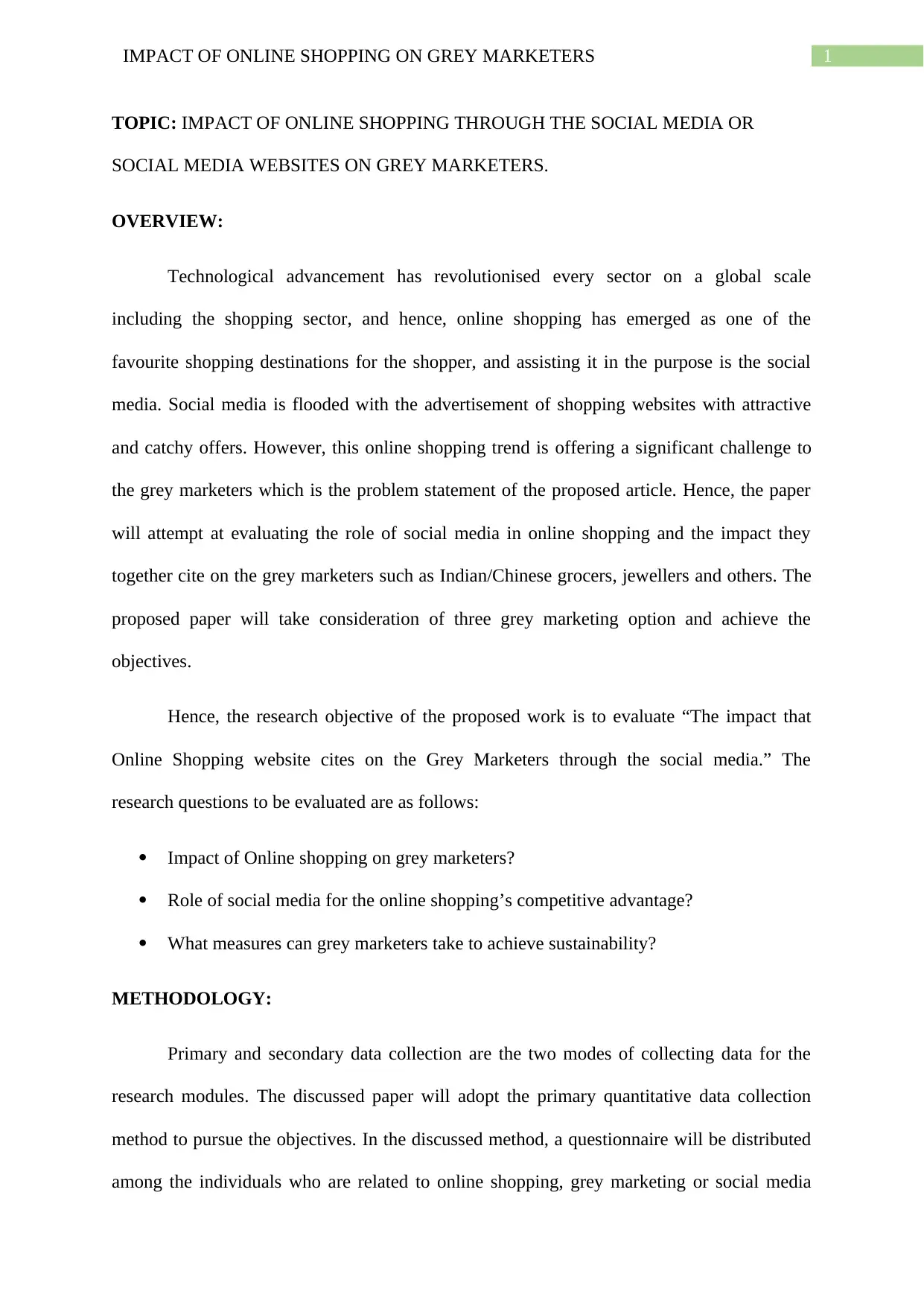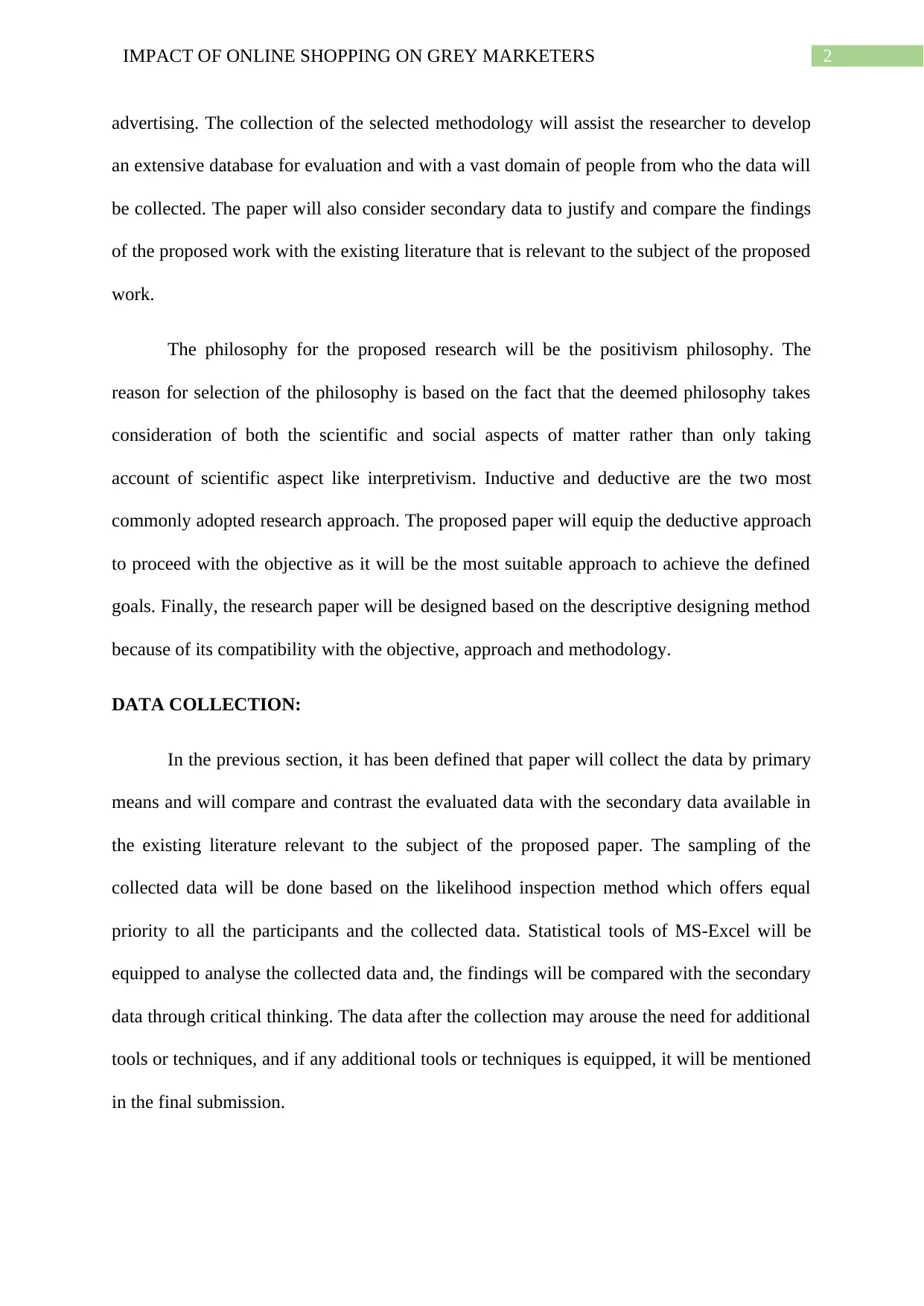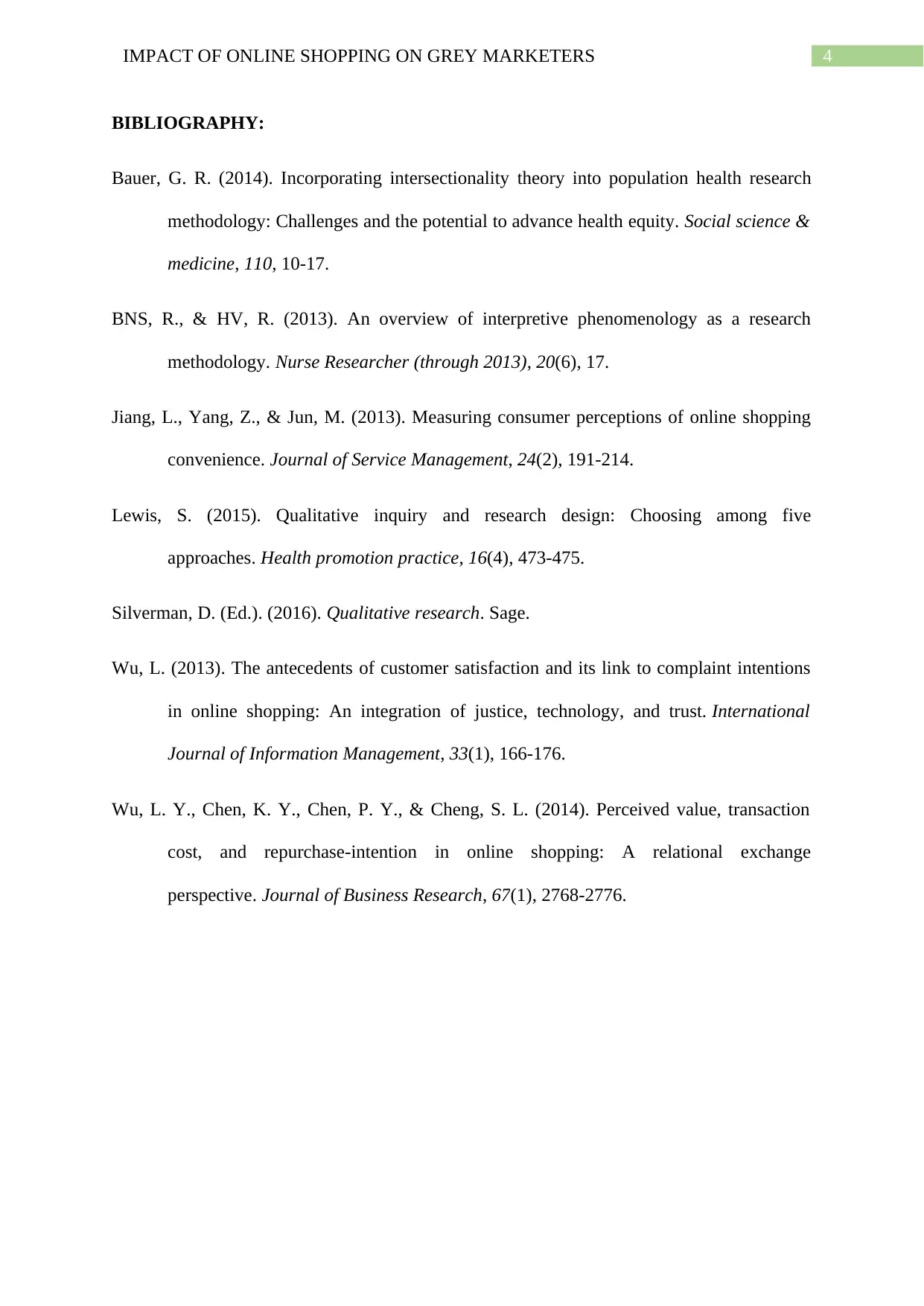Social Media & Online Shopping: Impact on Grey Marketers Project
VerifiedAdded on 2023/06/15
|5
|1003
|439
Project
AI Summary
This project proposal investigates the impact of online shopping, facilitated by social media, on grey marketers. The research aims to evaluate this impact, exploring the role of social media in online shopping's competitive advantage and suggesting sustainability measures for grey marketers. The methodology involves a primary quantitative data collection method, using questionnaires distributed among individuals involved in online shopping, grey marketing, and social media advertising. Secondary data will be used to compare and justify the findings. The research adopts a positivism philosophy and a deductive approach, employing a descriptive design. Data collection will prioritize ethical considerations, ensuring participant anonymity and informed consent. Statistical tools like MS-Excel will analyze the data, and findings will be compared with existing literature.

Running head: IMPACT OF ONLINE SHOPPING ON GREY MARKETERS
IMPACT OF ONLINE SHOPPING ON GREY MARKETERS: THROUGH SOCIAL
MEDIA WEBSITES
Name of The Student
Name of the University
Author Note
IMPACT OF ONLINE SHOPPING ON GREY MARKETERS: THROUGH SOCIAL
MEDIA WEBSITES
Name of The Student
Name of the University
Author Note
Paraphrase This Document
Need a fresh take? Get an instant paraphrase of this document with our AI Paraphraser

1IMPACT OF ONLINE SHOPPING ON GREY MARKETERS
TOPIC: IMPACT OF ONLINE SHOPPING THROUGH THE SOCIAL MEDIA OR
SOCIAL MEDIA WEBSITES ON GREY MARKETERS.
OVERVIEW:
Technological advancement has revolutionised every sector on a global scale
including the shopping sector, and hence, online shopping has emerged as one of the
favourite shopping destinations for the shopper, and assisting it in the purpose is the social
media. Social media is flooded with the advertisement of shopping websites with attractive
and catchy offers. However, this online shopping trend is offering a significant challenge to
the grey marketers which is the problem statement of the proposed article. Hence, the paper
will attempt at evaluating the role of social media in online shopping and the impact they
together cite on the grey marketers such as Indian/Chinese grocers, jewellers and others. The
proposed paper will take consideration of three grey marketing option and achieve the
objectives.
Hence, the research objective of the proposed work is to evaluate “The impact that
Online Shopping website cites on the Grey Marketers through the social media.” The
research questions to be evaluated are as follows:
Impact of Online shopping on grey marketers?
Role of social media for the online shopping’s competitive advantage?
What measures can grey marketers take to achieve sustainability?
METHODOLOGY:
Primary and secondary data collection are the two modes of collecting data for the
research modules. The discussed paper will adopt the primary quantitative data collection
method to pursue the objectives. In the discussed method, a questionnaire will be distributed
among the individuals who are related to online shopping, grey marketing or social media
TOPIC: IMPACT OF ONLINE SHOPPING THROUGH THE SOCIAL MEDIA OR
SOCIAL MEDIA WEBSITES ON GREY MARKETERS.
OVERVIEW:
Technological advancement has revolutionised every sector on a global scale
including the shopping sector, and hence, online shopping has emerged as one of the
favourite shopping destinations for the shopper, and assisting it in the purpose is the social
media. Social media is flooded with the advertisement of shopping websites with attractive
and catchy offers. However, this online shopping trend is offering a significant challenge to
the grey marketers which is the problem statement of the proposed article. Hence, the paper
will attempt at evaluating the role of social media in online shopping and the impact they
together cite on the grey marketers such as Indian/Chinese grocers, jewellers and others. The
proposed paper will take consideration of three grey marketing option and achieve the
objectives.
Hence, the research objective of the proposed work is to evaluate “The impact that
Online Shopping website cites on the Grey Marketers through the social media.” The
research questions to be evaluated are as follows:
Impact of Online shopping on grey marketers?
Role of social media for the online shopping’s competitive advantage?
What measures can grey marketers take to achieve sustainability?
METHODOLOGY:
Primary and secondary data collection are the two modes of collecting data for the
research modules. The discussed paper will adopt the primary quantitative data collection
method to pursue the objectives. In the discussed method, a questionnaire will be distributed
among the individuals who are related to online shopping, grey marketing or social media

2IMPACT OF ONLINE SHOPPING ON GREY MARKETERS
advertising. The collection of the selected methodology will assist the researcher to develop
an extensive database for evaluation and with a vast domain of people from who the data will
be collected. The paper will also consider secondary data to justify and compare the findings
of the proposed work with the existing literature that is relevant to the subject of the proposed
work.
The philosophy for the proposed research will be the positivism philosophy. The
reason for selection of the philosophy is based on the fact that the deemed philosophy takes
consideration of both the scientific and social aspects of matter rather than only taking
account of scientific aspect like interpretivism. Inductive and deductive are the two most
commonly adopted research approach. The proposed paper will equip the deductive approach
to proceed with the objective as it will be the most suitable approach to achieve the defined
goals. Finally, the research paper will be designed based on the descriptive designing method
because of its compatibility with the objective, approach and methodology.
DATA COLLECTION:
In the previous section, it has been defined that paper will collect the data by primary
means and will compare and contrast the evaluated data with the secondary data available in
the existing literature relevant to the subject of the proposed paper. The sampling of the
collected data will be done based on the likelihood inspection method which offers equal
priority to all the participants and the collected data. Statistical tools of MS-Excel will be
equipped to analyse the collected data and, the findings will be compared with the secondary
data through critical thinking. The data after the collection may arouse the need for additional
tools or techniques, and if any additional tools or techniques is equipped, it will be mentioned
in the final submission.
advertising. The collection of the selected methodology will assist the researcher to develop
an extensive database for evaluation and with a vast domain of people from who the data will
be collected. The paper will also consider secondary data to justify and compare the findings
of the proposed work with the existing literature that is relevant to the subject of the proposed
work.
The philosophy for the proposed research will be the positivism philosophy. The
reason for selection of the philosophy is based on the fact that the deemed philosophy takes
consideration of both the scientific and social aspects of matter rather than only taking
account of scientific aspect like interpretivism. Inductive and deductive are the two most
commonly adopted research approach. The proposed paper will equip the deductive approach
to proceed with the objective as it will be the most suitable approach to achieve the defined
goals. Finally, the research paper will be designed based on the descriptive designing method
because of its compatibility with the objective, approach and methodology.
DATA COLLECTION:
In the previous section, it has been defined that paper will collect the data by primary
means and will compare and contrast the evaluated data with the secondary data available in
the existing literature relevant to the subject of the proposed paper. The sampling of the
collected data will be done based on the likelihood inspection method which offers equal
priority to all the participants and the collected data. Statistical tools of MS-Excel will be
equipped to analyse the collected data and, the findings will be compared with the secondary
data through critical thinking. The data after the collection may arouse the need for additional
tools or techniques, and if any additional tools or techniques is equipped, it will be mentioned
in the final submission.
⊘ This is a preview!⊘
Do you want full access?
Subscribe today to unlock all pages.

Trusted by 1+ million students worldwide

3IMPACT OF ONLINE SHOPPING ON GREY MARKETERS
The paper will also take consideration of the ethical values and try to avoid any
ethical issue from arising. To achieve the ethically sound research work, the secrecy of
identity of the participants along with their informed consent will be ensured. The author will
even avoid any data manipulation, biases and any other form of ethical issues, and attempt at
developing an ethically suitable paper that can assess future improvement in the discussed
sector.
The paper will also take consideration of the ethical values and try to avoid any
ethical issue from arising. To achieve the ethically sound research work, the secrecy of
identity of the participants along with their informed consent will be ensured. The author will
even avoid any data manipulation, biases and any other form of ethical issues, and attempt at
developing an ethically suitable paper that can assess future improvement in the discussed
sector.
Paraphrase This Document
Need a fresh take? Get an instant paraphrase of this document with our AI Paraphraser

4IMPACT OF ONLINE SHOPPING ON GREY MARKETERS
BIBLIOGRAPHY:
Bauer, G. R. (2014). Incorporating intersectionality theory into population health research
methodology: Challenges and the potential to advance health equity. Social science &
medicine, 110, 10-17.
BNS, R., & HV, R. (2013). An overview of interpretive phenomenology as a research
methodology. Nurse Researcher (through 2013), 20(6), 17.
Jiang, L., Yang, Z., & Jun, M. (2013). Measuring consumer perceptions of online shopping
convenience. Journal of Service Management, 24(2), 191-214.
Lewis, S. (2015). Qualitative inquiry and research design: Choosing among five
approaches. Health promotion practice, 16(4), 473-475.
Silverman, D. (Ed.). (2016). Qualitative research. Sage.
Wu, L. (2013). The antecedents of customer satisfaction and its link to complaint intentions
in online shopping: An integration of justice, technology, and trust. International
Journal of Information Management, 33(1), 166-176.
Wu, L. Y., Chen, K. Y., Chen, P. Y., & Cheng, S. L. (2014). Perceived value, transaction
cost, and repurchase-intention in online shopping: A relational exchange
perspective. Journal of Business Research, 67(1), 2768-2776.
BIBLIOGRAPHY:
Bauer, G. R. (2014). Incorporating intersectionality theory into population health research
methodology: Challenges and the potential to advance health equity. Social science &
medicine, 110, 10-17.
BNS, R., & HV, R. (2013). An overview of interpretive phenomenology as a research
methodology. Nurse Researcher (through 2013), 20(6), 17.
Jiang, L., Yang, Z., & Jun, M. (2013). Measuring consumer perceptions of online shopping
convenience. Journal of Service Management, 24(2), 191-214.
Lewis, S. (2015). Qualitative inquiry and research design: Choosing among five
approaches. Health promotion practice, 16(4), 473-475.
Silverman, D. (Ed.). (2016). Qualitative research. Sage.
Wu, L. (2013). The antecedents of customer satisfaction and its link to complaint intentions
in online shopping: An integration of justice, technology, and trust. International
Journal of Information Management, 33(1), 166-176.
Wu, L. Y., Chen, K. Y., Chen, P. Y., & Cheng, S. L. (2014). Perceived value, transaction
cost, and repurchase-intention in online shopping: A relational exchange
perspective. Journal of Business Research, 67(1), 2768-2776.
1 out of 5
Related Documents
Your All-in-One AI-Powered Toolkit for Academic Success.
+13062052269
info@desklib.com
Available 24*7 on WhatsApp / Email
![[object Object]](/_next/static/media/star-bottom.7253800d.svg)
Unlock your academic potential
Copyright © 2020–2026 A2Z Services. All Rights Reserved. Developed and managed by ZUCOL.





